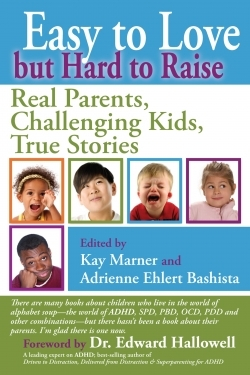Easy to Love but Hard to Raise
Real Parents, Challenging Kids, True Stories
In Easy to Love but Hard to Raise parents raising children with challenging—and invisible—mental and behavioral disabilities find an outlet to share their personal stories of overwhelming frustration as well as treasured moments of small triumph. While resources on invisible childhood disabilities are vast—the collection of new studies, treatments, and discoveries continues to grow each year—resources that focus on the parents who rear these children are harder to find.
Told in first person by a collective of parents, these personal essays pinpoint the difficult experiences that are unique to parents of children who exist in a world of “alphabet soup”—where a child can be labeled with a litany of confusing disorders that require treatments that are rarely uniform and straightforward. While the disabilities range from the well-known ADHD, Asperger’s syndrome, and autism to the lesser-known diagnosis of sensory integration dysfunction, the focus of all these essays is on the experience of parenting these children, not on the disability itself.
For this reason, the book functions effectively as a support network for parents. Divided into six chapters, the stories in this collection cover a diverse assortment of issues. Each narrative is perceptive and well written, pinpointing sensitive, often intangible issues that will ring true for other parents seeking solace and a sense of community. A number of the essays, for example, touch on the emotional challenge of reconciling the haphazard reality of raising a “difficult” child with the sentimental image of mothering as intuitive and natural. These parents lack the comfort of knowing that the inevitable challenges of parenting—tantrums, disobedience, tears—can be met with firm, tried-and-true parenting methods. Coming to terms with a reality vastly different from the norm is a running theme throughout this book.
Each chapter also features a “Tell Us More Q & A” section where an expert is interviewed and provides insight into the particulars of a parent’s story. An authority on ADHD, for example, provides answers as to why children with the disorder tend to have trouble making friends. Short, to-the-point answers provide a much-needed outside perspective that sheds light on the reasons behind behavior that appears befuddling. Also interspersed throughout each section is a first-person account by “Eve” a representative of “Everyparent,” whose short, pithy anecdotes are gleaned from real parents and are meant to serve as a unifying point of experience. Both these sections add further nuance and depth to the collection but at times can make it seem choppy rather than effectively streamlined.
Overall, however, this is an essential addition to the library of any parent raising a child with special challenges and will serve as an instrumental point of reference for caregivers and experts alike.
Reviewed by
Shoilee Khan
Disclosure: This article is not an endorsement, but a review. The publisher of this book provided free copies of the book to have their book reviewed by a professional reviewer. No fee was paid by the publisher for this review. Foreword Reviews only recommends books that we love. Foreword Magazine, Inc. is disclosing this in accordance with the Federal Trade Commission’s 16 CFR, Part 255.

